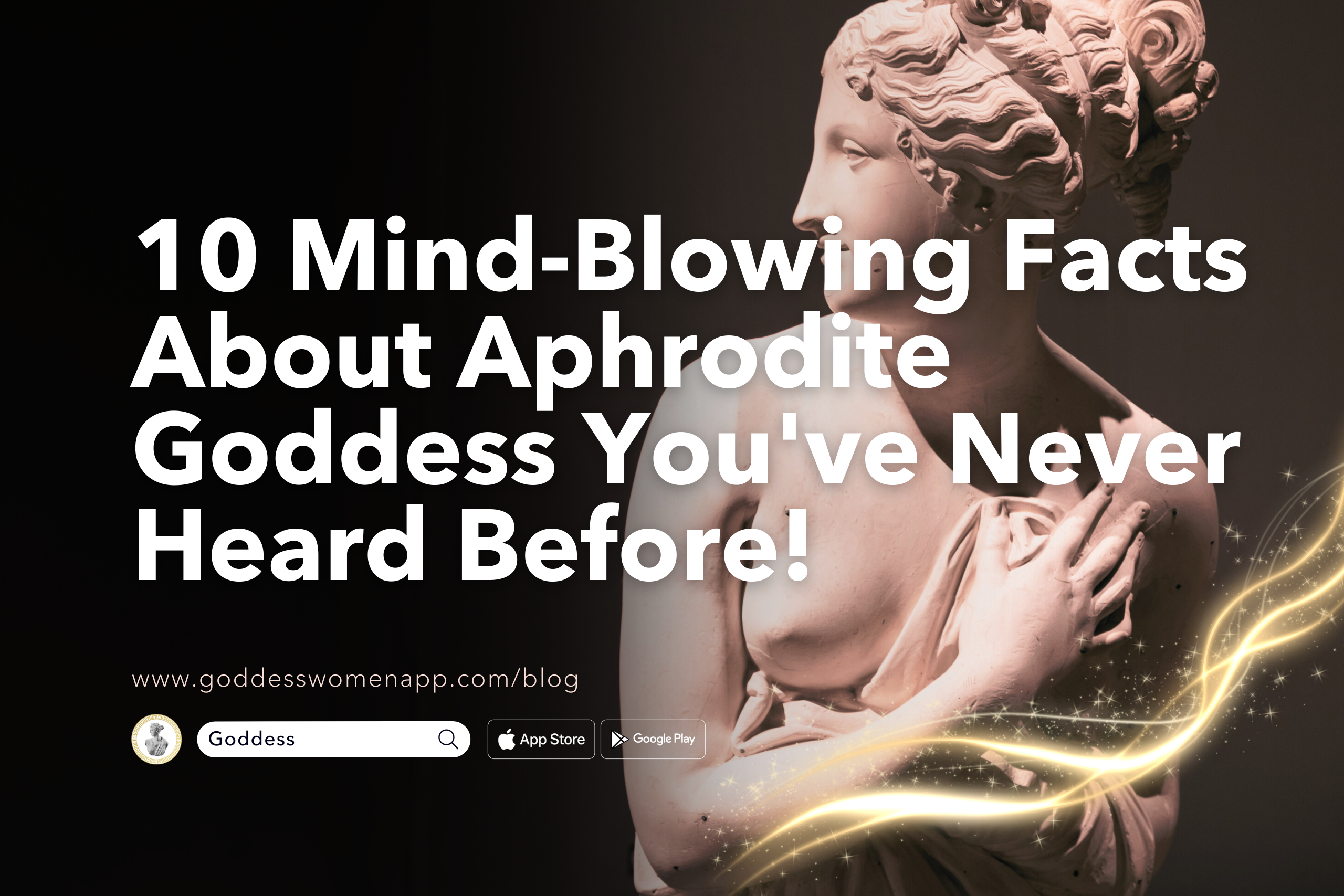Table of Contents
Introduction
Welcome to a journey through the enchanting myths of the ancient world, where gods and goddesses ruled the heavens and the earth with their formidable powers and captivating stories. Today, we’re diving into the heart of Greek mythology to uncover the mysteries of one of its most alluring figures: Aphrodite Goddess. Known as the embodiment of beauty, love, and passion, Aphrodite’s tales have fascinated scholars, artists, and dreamers for centuries. Whether you’re a mythology aficionado or a curious newcomer, prepare to be enthralled by the intriguing facts and myths surrounding the Goddess of Love. Let’s embark on this captivating exploration of Aphrodite Goddess and discover the allure that has captured hearts and imaginations throughout the ages.

The Birth of Aphrodite Goddess
The Enchanting Origins
The origins of Aphrodite, the Goddess of Love and Beauty, are as captivating as the deity herself. According to the most celebrated myth, Aphrodite’s birth was nothing short of miraculous and awe-inspiring. Born from the foam of the sea, she emerged fully grown into the world, a symbol of beauty and fertility. This remarkable birth took place near the island of Cyprus, and it’s said that she rode to shore on a shell, a scene immortalized by the Renaissance artist Botticelli in his famous painting “The Birth of Venus.” This image has become synonymous with the goddess, representing her connection to the sea and her emergence as a deity of unparalleled allure.
Variations Across Cultures
While the foam-born narrative is widely recognized, there are variations of Aphrodite’s birth that highlight the diversity of her worship and the spread of her myths across different cultures. Some accounts trace her lineage to Zeus and Dione, making her a product of the divine union of the king of the gods and a lesser-known goddess. This version emphasizes her Olympian connections and aligns her more closely with the pantheon of Greek deities.
The Significance of Her Birth
The birth of Aphrodite Goddess is not just a tale of divine emergence; it holds deep symbolic meaning, reflecting the ancient world’s views on beauty, creation, and the natural order. Her sea-born origin links her to the elemental forces of life, suggesting that love and beauty are as eternal and natural as the sea itself. Moreover, her arrival on the shores of Cyprus symbolizes the spread of love and beauty throughout the world, marking her influence on mortal and divine realms alike.
Aphrodite’s birth story sets the stage for her role in Greek mythology as a deity who transcends the boundaries of the heavens and the earth. Her origins embody the complex interplay between elemental forces and human emotions, making her one of the most fascinating and multifaceted figures in ancient mythology. As we delve deeper into the tales and attributes of Aphrodite Goddess, we uncover the layers of meaning behind her myths and the reasons why she remains a symbol of love and beauty that resonates with people to this day.
Stay tuned as we explore the powers, symbols, and legendary tales of Aphrodite, shedding light on her enduring legacy and the timeless allure that makes her an unforgettable figure in the pantheon of Greek gods and goddesses.
Aphrodite Goddess and the Trojan War
A Catalyst of Conflict
Aphrodite Goddess played a pivotal role in one of the most epic tales of Greek mythology—the Trojan War. Her involvement began with the infamous Judgment of Paris, an event that set the stage for the decade-long conflict. Paris, a prince of Troy, was tasked with deciding who among the goddesses Hera, Athena, and Aphrodite was the fairest. Aphrodite, promising Paris the love of Helen, the most beautiful mortal woman, was awarded the golden apple. This act ignited the flames of war, as Helen was already married to Menelaus, king of Sparta. Aphrodite’s influence over human emotions and desires is vividly displayed here, showcasing her power to sway the course of human history through love and beauty.
The Protector of Paris and Helen
Throughout the Trojan War, Aphrodite remained a staunch protector of Paris and Helen. Her divine intervention saved Paris from death on more than one occasion, most notably during his duel with Menelaus. When Paris was about to be defeated, Aphrodite enveloped him in a mist and transported him away to safety. Similarly, she shielded Helen, ensuring her safety and maintaining her bond with Paris. These actions highlight Aphrodite’s power to protect those she favors, manipulating the battlefield to serve her will and preserve the love she ordained.

The Powers of Aphrodite Goddess
The Essence of Attraction and Harmony
Aphrodite’s powers extended far beyond the realms of love and beauty. As the Goddess of Love, she had the divine ability to ignite desire and attraction among gods and mortals alike. Her influence was not limited to romantic love but also encompassed familial bonds, friendships, and the harmonization of different aspects of life. This power made her one of the most influential deities in the Greek pantheon, as she could alter relationships, provoke passion, and resolve conflicts through the sheer force of attraction.
The Manipulator of Emotions
Aphrodite’s ability to manipulate emotions was unparalleled. She could cause individuals to fall in love or hate, showcasing her control over the most primal human feelings. This aspect of her power was often depicted in myths where she would punish those who offended her by causing them to fall in love with inappropriate or disastrous targets. Conversely, she could also bestow happiness and mutual affection, demonstrating the dual nature of love as both a source of joy and pain.
A Symbol of Fertility and Life
Beyond her dominion over love, Aphrodite was also revered as a goddess of fertility and the life-giving aspects of nature. Her connection to the sea, from where she was born, and her association with various natural symbols (like the dove, the swan, and the rose) emphasize her role in promoting growth, renewal, and the continuation of life. Through her, the ancients understood the cyclical nature of life and the integral role that love and beauty play in the natural order of the world.
In conclusion, Aphrodite’s involvement in the Trojan War and her vast array of divine powers exemplify her complexity as a deity. From altering the course of epic battles to influencing the fundamental nature of human and divine relationships, Aphrodite Goddess stands as a testament to the ancient Greeks’ understanding of love’s power to shape the world. Her legacy, imbued with the power to inspire, protect, and even destroy, remains a fascinating aspect of ancient mythology, highlighting the enduring allure of the Goddess of Love and Beauty.
Aphrodite Goddess’ Love Life
A Marriage Crafted by the Gods
The love life of Aphrodite, the embodiment of love and desire, is as complex and intriguing as the goddess herself. Despite her associations with love and beauty, Aphrodite’s own marriage was arranged for reasons far from love. She was married to Hephaestus, the god of blacksmiths and craftsmen, known more for his skill and kindness than his appearance. This union, crafted by the gods, served more as a political alliance than a match of passion, highlighting the strategic marriages often depicted in Greek mythology.
Affairs of the Heart and Conflict
Aphrodite’s marriage to Hephaestus did not confine her desires or limit her romantic involvements. She is famously known for her affair with Ares, the god of war, a relationship that juxtaposed the themes of love and conflict. This affair, among others, underscores Aphrodite’s role in navigating the complexities of love beyond societal and marital constraints. Her liaisons with both gods and mortals, including Dionysus, Hermes, and the mortal Adonis, reveal the multifaceted nature of love, encompassing aspects of passion, jealousy, and tragedy.
The Love Story of Aphrodite and Adonis
One of the most poignant tales of Aphrodite’s love life is her relationship with Adonis, a mortal of unparalleled beauty. This story encapsulates the themes of love and loss, as Aphrodite’s affection for Adonis goes beyond mere desire to genuine love. The tragic death of Adonis, caused by a boar attack, showcases Aphrodite’s vulnerability and the depth of her emotions. Her mourning for Adonis and the establishment of the Adonia festival, commemorating his death, highlight the enduring impact of love and the pain of its loss.

Symbols of Aphrodite Goddess
The Emblem of Beauty and Fertility
Aphrodite’s symbols are as varied and significant as her roles in Greek mythology, each representing different aspects of her dominion over love, beauty, and fertility. The dove, symbolizing love and peace, is frequently associated with Aphrodite, reflecting her gentle and desirable aspects. Swans and sparrows, also linked to the goddess, signify the grace and allure of love.
Symbols of the Sea and Natural Beauty
Reflecting her origins from the sea, shells, particularly the scallop shell, emerge as potent symbols of Aphrodite, representing her birth and connection to the water’s generative powers. Pearls, as treasures from the sea, also symbolize the beauty and preciousness of love, underscoring its rarity and value.
Floral Symbols and Their Meanings
The myrtle wreath, roses, and apples serve as floral symbols associated with Aphrodite, each carrying specific connotations within her mythology. The myrtle, a plant sacred to the goddess, symbolizes love and immortality, reflecting the enduring nature of affection. Roses, linked to beauty and desire, often appear in stories involving Aphrodite, highlighting the pursuit of love despite its thorns. Apples, especially noted in the story of the Judgment of Paris, represent discord and desire, illustrating the dual nature of love’s power to unite and divide.
In sum, Aphrodite Goddess’ complex love life and her diverse symbols weave a rich tapestry that illustrates the multifaceted nature of love, beauty, and desire. From her strategic marriage to Hephaestus to her passionate affairs, and from the gentle dove to the enchanting rose, Aphrodite’s story and symbols encapsulate the essence of love’s power to inspire, transform, and even cause sorrow. Through these myths and symbols, the ancient Greeks explored the depths of human emotion, revealing the eternal relevance of Aphrodite’s tales in understanding love’s enduring legacy.
Aphrodite Goddess’ Temples and Worship
Sanctuaries of Beauty and Devotion
The worship of Aphrodite, the Goddess of Love and Beauty, was widespread across the ancient Greek world, with numerous temples and sanctuaries dedicated to her honor. These sacred sites served not only as places of worship but also as centers for the celebration of beauty, love, and fertility. Among the most famous of these was the Temple of Aphrodite at Paphos on the island of Cyprus, her mythical birthplace. This temple became a major pilgrimage site, attracting devotees from across the Mediterranean to participate in rituals and offerings to the goddess.
Rituals and Offerings
Worship practices dedicated to Aphrodite varied, reflecting her diverse aspects as a deity of love, beauty, fertility, and the sea. Rituals often involved the offering of incense, flowers, and symbols of beauty and fertility. Priests and priestesses served her temples, conducting ceremonies that included the singing of hymns, dancing, and the performance of sacred rites intended to invoke the goddess’s favor and blessings. The worship of Aphrodite emphasized the joy and beauty of love, celebrating its power to bring people together and foster life.

Aphrodite’s Role in Modern Culture
From Mythology to Modernity
Aphrodite’s influence extends far beyond the ancient world, permeating modern culture in various forms. Her myths and symbols continue to inspire contemporary literature, art, and cinema, serving as a testament to the enduring allure of love and beauty. Aphrodite’s image, often characterized by her iconic birth from the sea, has been reimagined through the ages, symbolizing the timeless and universal nature of beauty and desire.
The Goddess in Literature and Film
In literature, Aphrodite has been portrayed in myriad ways, from the tragic and comedic to the romantic and philosophical, reflecting the complexity of love and human relationships. In film and television, characters inspired by Aphrodite capture the imagination, exploring themes of love, power, and transformation. Moreover, the goddess’s influence is evident in fashion and beauty, where her ideals of beauty continue to shape trends and perceptions.
Festivals and Celebrations Honoring Aphrodite Goddess
Ancient Festivities Reimagined
In ancient times, festivals such as the Aphrodisia were held in honor of Aphrodite, celebrating love, beauty, and fertility through rituals, processions, and feasts. These festivals were significant events in the calendar, marking times of communal joy and worship dedicated to the goddess. While the original celebrations have faded into history, the spirit of these festivals lives on in modern celebrations of love and beauty, such as Valentine’s Day, which echoes the themes of Aphrodite’s worship through the exchange of gifts and expressions of love.
Contemporary Celebrations and Cultural Legacy
Today, Aphrodite’s legacy can be seen in cultural festivals and artistic events that celebrate love and beauty, drawing on the rich symbolism and mythology of the goddess. Art exhibitions, poetry readings, and performances inspired by Aphrodite’s stories and attributes continue to captivate audiences, fostering a connection to the ancient past through the universal language of love.
In conclusion, the temples and worship of Aphrodite Goddess, her role in modern culture, and the festivals and celebrations in her honor illustrate the timeless appeal of the goddess. From ancient rituals in magnificent temples to her influence in contemporary arts and culture, Aphrodite continues to inspire and captivate, embodying the enduring power of love and beauty in the human experience.
The Darker Side of Aphrodite Goddess
The Complexity of Love and Jealousy
While Aphrodite Goddess is predominantly celebrated for her embodiment of love and beauty, her mythology also reveals a darker, more complex side. This aspect is characterized by tales of jealousy, revenge, and the turmoil that can arise from love’s passions. Aphrodite’s involvement in the affairs of both gods and mortals often led to conflicts, showcasing the destructive potential of love and desire when left unchecked. Her jealousy, particularly evident in the myths involving her husband Hephaestus and her numerous lovers, highlights the goddess’s possessive and vengeful nature.
Manipulation and Punishment
Aphrodite’s darker traits were also manifested in her willingness to manipulate emotions and relationships to achieve her ends. Myths such as the curse placed upon the women of Lemnos, punishing them for neglecting her worship, illustrate her capacity for cruelty in response to perceived slights. These stories serve as cautionary tales, reminding us of the power of love to lead to both creation and destruction, depending on how it is wielded.
Aphrodite’s Legacy in the Modern World
A Symbol of Enduring Beauty and Complexity
In the modern world, Aphrodite’s legacy is a testament to the enduring fascination with love, beauty, and the complexities of human relationships. She remains a figure of immense cultural significance, embodying the dual nature of love’s capacity for both profound connection and deep conflict. In art, literature, and psychology, Aphrodite continues to inspire exploration into the nuances of love and desire, encouraging a deeper understanding of their roles in human experience.
The Aphrodite Archetype in Psychology
The concept of the Aphrodite archetype, particularly in Jungian psychology, offers insights into the power of love and creativity within the human psyche. This archetype represents the generative, life-affirming aspects of love, as well as the potential for jealousy and strife that accompanies deep passion. Understanding the Aphrodite archetype allows individuals to explore the multifaceted nature of their own relationships and creative impulses, acknowledging both the light and shadow sides of love and desire.
Conclusion
The tales of Aphrodite Goddess, spanning from her enchanting origins to her complex relationships and legacy, offer a rich tapestry of mythology that continues to captivate and inspire. Through her, we explore the myriad facets of love, from its ability to unite and create to its potential to divide and destroy. Aphrodite’s enduring appeal lies in her embodiment of beauty and love, reflecting the universal human experience with all its joys and sorrows.
As we reflect on Aphrodite’s legacy, let us embrace the opportunity to delve deeper into our understanding of love and creativity. For those intrigued by the allure of the Aphrodite archetype, the Goddess app offers a unique journey into the self. Take the archetype test available on the app to discover the light and shadow sides of the Aphrodite Archetype within you. Explore the depths of your own passions, desires, and creative potentials, and unlock the mysteries of love and beauty that reside within your soul.





